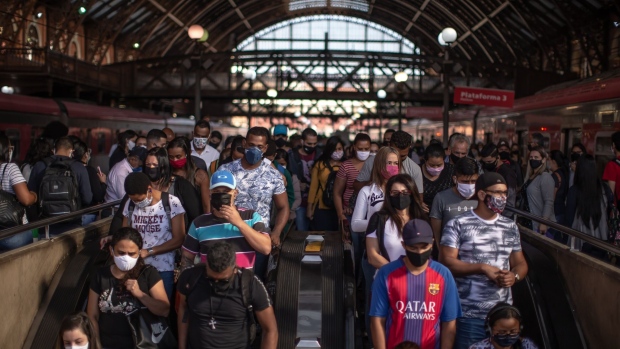Jul 9, 2020
Brazil finds reopening the economy only brings a modest recovery
, Bloomberg News

Brazil’s aggressive push to reopen businesses before controlling the coronavirus pandemic is so far yielding only modest gains, with industrial output and retail recovering just part of their historic losses.
Cities from Rio de Janeiro to Brasilia are lifting restrictions on commerce while new cases of COVID-19 hover near records. As the World Health Organization warns the peak of the pandemic remains weeks away, even President Jair Bolsonaro tested positive for the virus on Tuesday.
A modest rebound seen in May has already lost steam in June, central bank director Fabio Kanczuk said last week, ruling out the possibility of a V-shaped recovery going forward. As business owners who are trying to resume operations have found, fears of getting the virus will keep many customers at home even if they reopen stores.
“We may have the worst of both worlds,” said Andre Perfeito, chief economist at Necton Investimentos. “The economic recovery may not happen quickly, and the virus may be around for longer.”
The restart takes place as the number of new infections hover above 40,000 per day, a figure that’s near daily rises recorded in the U.S. even though the South American country has over 100 million fewer people. In contrast, Peru is loosening restrictions with its rolling five-day average of new virus cases trending down, while Argentina extended its lockdown after infections rose.
Customer Messages
In the Federal District, where Brasilia is located, shopkeepers beckon customers with virus cases rising over three per cent per day in early July. By comparison, New York state is loosening restrictions on commerce with daily increases well below one per cent.
Marcel Rates is one of the shop owners trying to revive business in the face of the health crisis. When Rates reopened his liquor stores in Brasilia, he thought his offering of specialty drinks coupled with extra safety measures like hand sanitizer would quickly lure clients back.
Instead, he’s received a stream of messages from worried shoppers wanting to know how full his shops are before deciding if they’ll venture out. Those who do enter his stores spend less money in shorter visits on fears of being exposed to the coronavirus, meaning sales are suffering.
“And what the government is doing in terms of providing loans won’t be enough,” he said.
‘Fear Factor’
Nationally, consumer confidence as measured by business school Fundacao Getulio Vargas is running on par with sentiment in the throes of Brazil’s 2015-2016 recession.
“The fear factor is a difficult question to answer, and it is a very important issue,” central bank President Roberto Campos Neto told reporters on June 25. “It’s going to be with us well into next year.”
Small business owners are not the only ones that have been slow to revive demand amid the pandemic. Ruy Kameyama, the CEO of shopping mall operator BR Malls Participacoes, said vehicle flows and sales were down 50 per cent compared to pre-virus levels, and that shoppers are spending less time in his company’s locations, according to the transcript of a June 5 earnings call.
“It will take time to see consumption returning to pre-pandemic levels,” Gersan Zurita, Senior Vice President at Moody’s Investors Service, wrote in a report dated July 8. “Unemployment and the uncertainty surrounding the ultimate duration and severity of the pandemic have driven consumer confidence to record low levels.”
More Testing
In an effort to support the economy, Bolsonaro’s administration is extending emergency payments to informal workers while the central bank has cut its interest rate to a record low, freed up billions of dollars for credit and sought to improve lending to smaller companies.
Retail sales in May jumped more than analysts expected due in part to that stimulus and the rollback of some confinement measures, though industry association IBEVAR expects them to drop 10 per cent over 2019.
The government is also trying to support the reopening with a plan to test 20 per cent of the population. Yet, a second wave of COVID-19 would hit Brazil harder than most countries in the region, according to a report from the Organisation for Economic Co-operation and Development which forecasts Latin America’s largest economy to shrink by 9.1 per cent if that situation arose. Brazil’s central bank is estimating a 6.4 per cent drop this year in an outlook that doesn’t contemplate a second wave, Kanczuk said.
Meanwhile, Bolsonaro is continuing to minimize the threat of the virus. This month, he vetoed a proposal that would have make the use of face mask obligatory in places such as stores and churches. The presidency’s press office declined to comment on this story.
“No one wants to stroll around the zoo if the lion is out,” said Adriana Dupita, a Latin America economist at Bloomberg Economics. “Lifting social distancing does not necessarily bring consumers back to shops and restaurants, especially if contagion risk still looms.”

